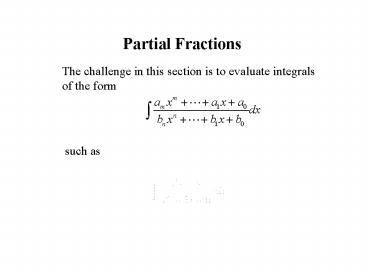Partial Fractions - PowerPoint PPT Presentation
1 / 12
Title:
Partial Fractions
Description:
Case 1: q(x) is a product of distinct linear factors, eg. q(x) = (x - a)(x - b)(x - c) ... We first need to perform some algebra before integrating. Example: ... – PowerPoint PPT presentation
Number of Views:305
Avg rating:3.0/5.0
Title: Partial Fractions
1
Partial Fractions
The challenge in this section is to evaluate
integrals of the form
such as
2
Partial Fractions
- a technique that decompose a fraction or a
rational function into a sum of several fractions
(or rational functions) with simpler denominators.
Examples
and
etc.
3
Review A rational function is of the form
where p(x), q(x) are polynomials in x and q(x) is
nonzero.
We say that the rational function
is reduced
if the degree of p(x) is less than that of q(x).
4
Assuming that
is reduced, we will consider
several cases
Case 1 q(x) is a product of distinct linear
factors, eg. q(x) (x -
a)(x - b)(x - c)
where a, b, c are all different.
In this case,
for some constants A, B, and C that can be
determined by substitution.
5
Case 2 q(x) is a product of repeated linear
factors, eg. q(x) (x -
a)(x - b)(x - b)
where a, b are different.
In this case,
for some constants A, B, and C that can be
determined by substitution or comparing
coefficients.
6
Case 3 q(x) is a product of linear and
irreducible distinct quadratic factors,
eg. q(x) (x - a)(x - b)(cx2 dx e)
where a,
b are different.
Irreducible means that (cx2 dx e) does not
have real roots.
In this case,
for some constants A, B, C, and D that can be
determined by substitution or comparing
coefficients.
7
Case 3 q(x) is a product of linear and
irreducible distinct quadratic factors,
To integrate rational expressions of the form
we have to complete the square in the denominator
and then integrate by substitution. This
technique is best explained by examples.
8
Example
We first need to perform some algebra before
integrating
9
(No Transcript)
10
The first expression can be integrated by
substituting u (
x2 2x 5) while the second one can be
integrated by substituting
( x 1) 2 tan ?
11
(No Transcript)
12
The final answer is therefore































